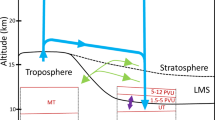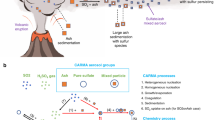Abstract
SULPHUR bearing compounds constitute a major portion of globally distributed persistent aerosol layer in the lower stratosphere1–3 and some considerations1 indicate that the particles are formed in situ, presumably by the oxidation of gases containing sulphur. The relative importance of various terrestrial sources, however, has not been ascertained.
This is a preview of subscription content, access via your institution
Access options
Subscribe to this journal
Receive 51 print issues and online access
$199.00 per year
only $3.90 per issue
Buy this article
- Purchase on Springer Link
- Instant access to full article PDF
Prices may be subject to local taxes which are calculated during checkout
Similar content being viewed by others
References
Junge, C. E., Chagnon, C. W., and Manson, J. R., J. Meteorol., 18, 81 (1961).
Friend, James P., Tellus, 18(2) 465 (1966).
Lazrus, A. L., Gandrud, B., and Cadle, R. D., J. geophys. Res., 76, 8083 (1971).
Castleman, jun., A. W., Munkelwitz, H. R., and Manowitz, B., Tellus (in the press).
Tucker, W. D. (ed.), The Atmospheric Diagnostic Program the Brookhaven National Laboratory: Third Status Report, BNL-50280 (1970).
Author information
Authors and Affiliations
Rights and permissions
About this article
Cite this article
CASTLEMAN, A., MUNKELWITZ, H. & MANOWITZ, B. Contribution of Volcanic Sulphur Compounds to the Stratospheric Aerosol Layer. Nature 244, 345–346 (1973). https://doi.org/10.1038/244345a0
Received:
Issue Date:
DOI: https://doi.org/10.1038/244345a0
This article is cited by
-
Sulfur and oxygen isotope ratios in sulfate during an acidification reversal study at Lake G�rdsj�n, Western Sweden
Water, Air, & Soil Pollution (1995)
-
Nucleation processes and aerosol chemistry
Space Science Reviews (1974)
Comments
By submitting a comment you agree to abide by our Terms and Community Guidelines. If you find something abusive or that does not comply with our terms or guidelines please flag it as inappropriate.



